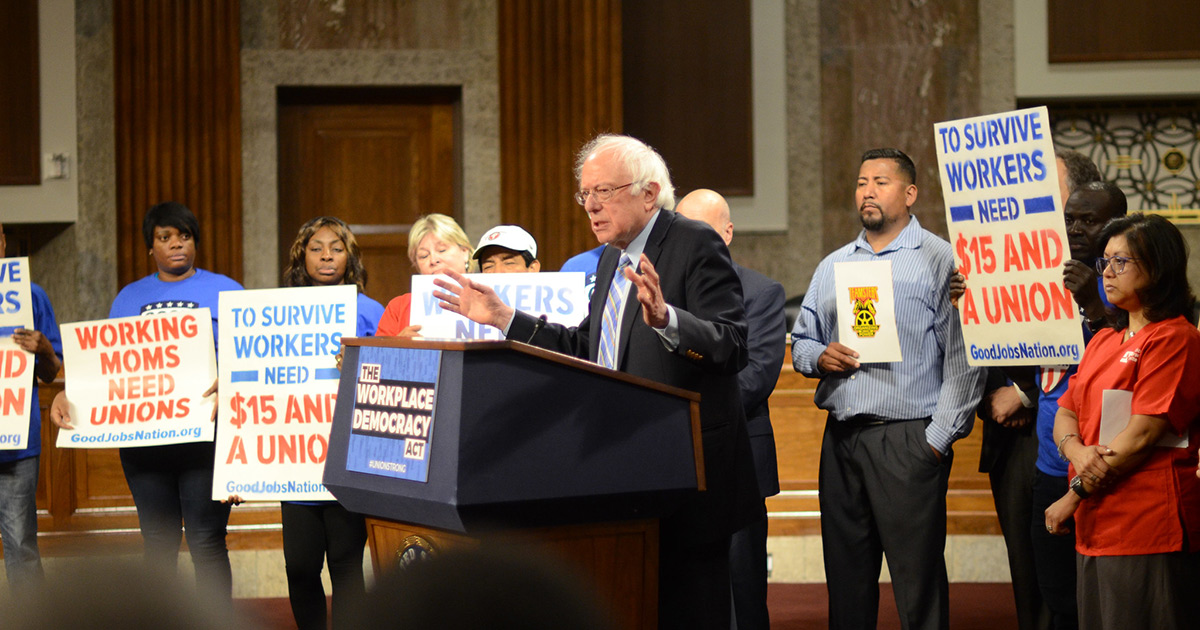Bernie Versus the Establishment? - 5 minutes read
 Bernie Versus the Establishment?
Bernie Versus the Establishment?How often have we heard that we should stop relitigating the 2016 primaries? It became an incantation for those hoping for a way out from a demoralizing Trump presidency and the exhausting permanent campaign of contemporary political life. But in the hangover of the first debates, it’s easy to long for the simple (in hindsight) story of the last presidential race: the clear favorite of the centrist Democratic leadership beats a left insurgent campaign, only to lose to a ghoulish celebrity billionaire who promised to sweep away the corrupt establishment.
Bernie Sanders is back, trying to build on the strength of the political organization that formed around him in the last election and his popularity across a broader swath of the country. But the current Democratic field lacks the clear polarization of 2016. Among his core supporters (myself included), Bernie is still distinguished by his appeal to mass politics, and his baseline of diehard support appears higher than that of any other candidate. Now, however, he faces not only Joe Biden, the living embodiment of the status quo ante, but a field of twenty-five Democratic candidates—a number whose absurdity came into focus during the disorienting spectacle of the first debates, run miserably by NBC and company.
Elizabeth Warren’s sincere reformism has narrowed the political territory Bernie can claim as his own, as have the far less sincere promises of other candidates who have leaned into the leftward movement of the party’s base. Sanders also struggles with the desire of some voters to nominate someone who isn’t a white man—a desire that’s especially understandable in the face of a sitting president with violent misogynist and racist instincts. Biden, meanwhile, leads the cause of restoration, but is also contending with a handful of conservative Democrats in his corner.
The most compelling drama of the debates was Kamala Harris’s confrontation with Biden over busing. Even as someone habituated to dunking on the former vice president, I was shocked to watch him defend a state’s right to oppose desegregation on a Democratic debate stage in 2019. That Biden’s troubling past on civil rights is now a problem for him is a credit to way the new black freedom struggle, and the broader anti-racist coalitions that have emerged to confront the far right, have shifted what is politically acceptable within the Democratic Party. (Those same movements are what makes Harris’s record as a prosecutor a problem for her.)
In fact, as my colleague Joshua Leifer argues, the debates were replete with signs of a legitimation crisis that movements—for black lives, against patriarchy, for socialism, against the fossil fuel industry, for migrants’ rights—have brought down on the head of the political establishment. That crisis was the subtext every time a moderator asked whether a candidate could actually implement and pay for what they were offering to voters tired of incremental changes on the road to nowhere. It was the subtext for every candidate who said, “I agree that we face great challenges, but I still promise you less than you deserve.”
The effects of radical political energy on this race are undeniable but also uncertain. The general mood of the party base has moved left, but most voters still aren’t making choices along strictly ideological lines. And even as sane people have been disabused of their ability to make predictions after 2016, the mainstream press remains obsessed with who’s up, and who’s down; who’s won the day; who’s got that ineffable electable quality. The influence of corporate media on our political perceptions has diminished but not gone away.
In the face of this uncertainty and confusion, some who express sympathy for Bernie have come to question why so many people—especially young people—remain so committed to his campaign. He might lose; what then? And isn’t it good that his uncompromising politics have rubbed off a bit on others? But over and over, Sanders, more than any other candidate, has told us the truest thing about this campaign: it is nowhere near enough. We don’t know whether we’ll succeed in bringing about the social forces, institutional transformations, and cultural shifts we need to avert a more barbaric future. But Sanders, like the movements that he supports, calls on us to sharpen our common sense of what is wrong, and to organize for something better. He validates a deeply felt sense of urgency about a raging far right, a burning planet, and a half-century of structural crisis whose social consequences now radiate throughout the capitalist core. Whatever happens in this election, we’ll need each other’s strength and intelligence for the battles to come.
Source: Dissentmagazine.org
Powered by NewsAPI.org
Keywords:
Incantation • Permanent campaign • Hangover • United States presidential election, 2016 • Centrism • Democracy • Left-wing politics • Insurgency • Political campaign • Political corruption • The Establishment • Bernie Sanders • Democracy • Polarization density • Mass politics • Joe Biden • Status quo • Democracy • NBC • Elizabeth Warren • Reformism • Politics • Left-wing politics • Social movement • Political party • Bernie Sanders • Voting • White people • Motivation • President of the United States • Violence • Misogyny • Racism • Kamala Harris • Joe Biden • Desegregation busing • Vice President of the United States • Desegregation • Democratic Party (United States) • Civil and political rights • Anti-racism • Far-right politics • Democratic Party (United States) • Social movement • Prosecutor • Legitimation crisis • Social movement • Patriarchy • Socialism • Fossil fuel • Immigration • Rights • No More Tears • Political radicalism • Ideology • Quality (philosophy) • Social influence • Corporate media • Politics • Perception • Sympathy • Politics • Bernie Sanders • Institution • Culture • Barbarian • Future • Social movement • Common sense • Right-wing politics • Social science • Consequentialism • Capitalism • Virtue • Intelligence •